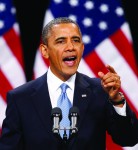Lawmakers this week proposed national plans to reform the immigration system, which would provide a clear path to citizenship for undocumented students at UCLA.
On Sunday, a bipartisan group of senators unveiled a blueprint outline addressing the path to citizenship, employment and worker programs. In response, President Barack Obama delivered a speech on Tuesday to outline his own immigration plan. The proposals would affect about 11 million individuals who currently reside in the U.S. without legal status, according to the nonpartisan Center for Immigration Studies.
“The good news is that – for the first time in many years – Republicans and Democrats seem ready to tackle this problem together,” Obama said to a crowd of high school students in Las Vegas. “It is time to act to fix the broken immigration system in a way that requires responsibility from everyone.”
Both Obama’s and Congress’ plans involve identical measures, including an increase in border security, an earned path to citizenship, penalties for businesses that hire undocumented individuals and giving more visas to skilled foreign workers.
To increase border security, lawmakers who back the plan propose investing in infrastructure, technology and efforts to decrease criminal activity such as human trafficking.
To be eligible for citizenship, applicants would need to pay fees, pass background checks, learn English, and learn about civics and American history, according to the plans.
Both Obama and Senate members said in their proposals that they plan to expedite the citizenship path for skilled workers and young people who attend college or join the armed forces for a designated period of time.
Undocumented students at UCLA could enter the process to receive citizenship status relatively quickly if the proposed reforms go into effect.
Seth Ronquillo, a third-year film and television student and undocumented individual, said he is pleased with the recent progress in immigration reform but is not satisfied with some parts of the plans, including the proposal to increase border enforcement.
“I am excited that there has been more progress on immigration than there has been for years,” said Ronquillo, also a former Daily Bruin columnist. “But I think some provisions, like putting more arms (on the border), will only have a negative effect on hopeful immigrants who come here to have a better life.”
Many Republicans in Congress, including Rep. Lamar Smith (R-Texas), have said they do not support the recent proposals.
“This administration ignores what is really broken – our fiscal future,” Smith said in a press release. “Our immigration laws aren’t broken, they just aren’t enforced.”
Hiroshi Motomura, a UCLA law professor, said Latino voters, who tend to push for immigration reform, had a record turnout in the 2012 election. This may have motivated Obama to make the topic a priority, he said.
Though Motomura has not been able to review the plans yet, he said it seems as though Republicans and Democrats alike are feeling the same stress to pass immigration reform.
The immigration reform proposals come months after deferred action, which allows some undocumented minors who arrived before the age of 16 to stay in the country legally for up to two years, went into effect.
The policy is not, however, a path to citizenship.
Earlier this month, the Obama administration also implemented a new “extreme hardship” rule, which reduces the amount of time that undocumented individuals applying for legal status in the U.S. are separated from their immediate citizen relatives, according to the Homeland Security website. Undocumented individuals may now qualify to view the status of their application within the United States instead of returning to their country of origin to do so.
Despite these measures, some students said they are skeptical of Obama’s motivation to pass these policies.
“This was during the election season, so it would be his own interest to pass these measures,” said Matthew Abularach, a fifth-year Chicana and Chicano studies and political science student who is the internal vice chair for MEChA de UCLA, a Latino student organization. He said he feels deferred action and the “extreme hardship” rule may have been a “ninth-inning move” to win more votes.
Immigration reform has been a hotly debated topic, and has often been risky for presidents to undertake in the past, Motomura said.
Though he touched on immigration-related policies, Obama did not focus as much on comprehensive immigration reform in his first term and may be using the heightened public demand to push Congress to pass reform soon, said Raúl Hinojosa-Ojeda, a Chicana/o studies associate professor at UCLA.
“In (Obama’s) first four years, there was no point in bringing up immigration in Congress because it is a highly divisive issue, especially with Republicans,” Hinojosa-Ojeda said. “Obama has had the tendency to act on issues when the political situation becomes ripe and the public expectation is high.”
Over the next few months, Hinojosa-Ojeda said he expects congressmen – including many Republicans – will feel more pressure to pass legislation in line with the blueprints if Obama continues to be publicly active in the debate on immigration reform.
Still, Motomura said he expects the issue will take up a lot of time and legislative space in Congress in the coming months.
“There is belief that Obama is doing this for the Latino vote, but there are a lot of political risks here too,” Motomura said.

Like